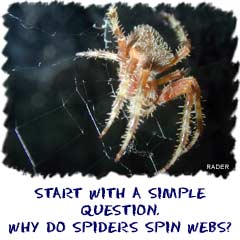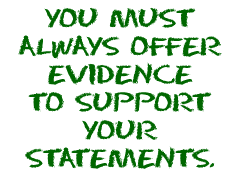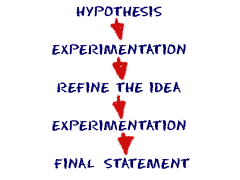 Learning about the scientific method is almost like saying that you are learning how to learn. The scientific method is a process used by scientists to study the world around them. It can also be used to test whether any statement is accurate. You can use the scientific method to study a leaf, a dog, an ocean, or the entire Universe.
Learning about the scientific method is almost like saying that you are learning how to learn. The scientific method is a process used by scientists to study the world around them. It can also be used to test whether any statement is accurate. You can use the scientific method to study a leaf, a dog, an ocean, or the entire Universe. We all have questions about the world. The scientific method is there to test if your answer was correct. You could ask, "Why do dogs and cats have hair?" One answer might be that it keeps them warm. A good scientist would then come up with an experiment to test whether the statement was accurate. BOOM! It's the scientific method in action. (OK, settle down.)
Questions and Answers
Just about everything starts with a question. Usually, scientists come up with questions by looking at the world around them. "What is that?" See that squiggly thing at the end of the sentence? A question has been born.So you've got a scientist. When scientists see something they don't understand they have some huge urge to answer questions and discover new things. It's one of those scientist personality traits. The trick is that you have to be able to offer some evidence that confirms every answer you give. If you can't test your own answer, other scientists can't test it to see if you were right or not.
 As more questions are asked, scientists build a foundation of answers. Once you have a lot of individual answers, it’s time to organize. One of the cool things about science is that other scientists can learn things from what has already been established. They don't have to go out and test everything again and again. Science is special because it builds on what has been learned before.
As more questions are asked, scientists build a foundation of answers. Once you have a lot of individual answers, it’s time to organize. One of the cool things about science is that other scientists can learn things from what has already been established. They don't have to go out and test everything again and again. Science is special because it builds on what has been learned before. The whole process allows the world to advance, evolve, and grow. All of today's advancements are based on the achievements of scientists who already did great work. For example, you will never have to show that water (H2O) is composed of one oxygen (O) and two hydrogen (H) atoms. Many scientists before you have confirmed that fact. It will be your job as a new scientist to take that knowledge and use it in new experiments.
Experimental Evidence
Experimental evidence is used to confirm the answers in science. Results are validated (found truthful) when other scientists repeat experiments and come up with the same results. A history of evidence and validations show that the original statements were correct and accurate. It is a simple idea and the basis of all science. Statements must be confirmed with loads of evidence. Scientists start with general observations and then make ahypothesis. A hypothesis is somewhere between a statement and a guess. It is a proposed explanation for something that was observed. One example of a hypothesis might be, "All flowers are yellow."
Scientists start with general observations and then make ahypothesis. A hypothesis is somewhere between a statement and a guess. It is a proposed explanation for something that was observed. One example of a hypothesis might be, "All flowers are yellow." Once you have a scientific hypothesis, the fun can begin. You need to test the hypothesis with an experiment and a series of procedures. The trials and tests will lead to observations and data. The data is the evidence you can use to determine if the hypothesis was correct.
It is very important that the experiment is objective. You must use controls which are quantitative (based on values and figures, not opinions or emotions). Scientists can then examine the results and develop newer ideas. This process will lead to more observation and refinement of hypotheses. Science needs both ideas (the hypothesis) and facts (the quantitative results) to move forward.
So what about that first hypothesis? Are all flowers yellow? No they aren’t. Why? We went outside and took a picture of a red flower. The existence of one red flower means the original hypothesis was incorrect. A curious scientist might make another hypothesis that says all flowers are red or yellow. You could test that hypothesis by looking at a larger variety of flowers.
Accumulation of Evidence
There are different terms used to describe scientific ideas based on the amount of confirmed experimental evidence.Hypothesis - a statement that uses a few observations
- an idea or proposition based on observations without experimental evidence
Theory
- uses many observations and has loads of experimental evidence
- can be applied to unrelated facts and new relationships
- flexible enough to be modified if new data/evidence introduced
Law
- stands the test of time, often without change
- experimentally confirmed over and over
- can create true predictions for different situations
- has uniformity and is universal
You may also hear about the term "model." A model is a scientific statement that has some experimental validity or is a scientific concept that is only accurate under limited situations. Models do not work or apply under all situations in all environments. They are not universal ideas like a law or theory. Climatologists use many models to predict climate changes. Each model is dependent on specific variables and situations.








0 comments:
Post a Comment